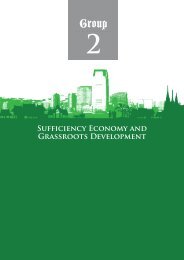Conflict, Legitimacy and Government Reform: Equitable Allocation of ...
Conflict, Legitimacy and Government Reform: Equitable Allocation of ...
Conflict, Legitimacy and Government Reform: Equitable Allocation of ...
Create successful ePaper yourself
Turn your PDF publications into a flip-book with our unique Google optimized e-Paper software.
70 KPI Congress XI<br />
A state like Thail<strong>and</strong> that is not opened up to media freedom or<br />
social movements <strong>of</strong> different groups implicitly bars the general public<br />
from getting involved in the formulation <strong>of</strong> public policies.<br />
If that’s the case, where does a public policy in Thail<strong>and</strong> originate<br />
from?<br />
One way is from politicians who hold an administrative position,<br />
especially right after assuming a position <strong>and</strong> before being lobbied by<br />
government departments under his or her comm<strong>and</strong>, technocrats or<br />
capitalist groups <strong>and</strong> businesses.<br />
For example, solving cost <strong>of</strong> living increase problems by using<br />
satang coins which were implemented by other prime ministers in the<br />
past or putting a lid on salary increase <strong>of</strong> government employees (around<br />
five million people) because the news could tempt retailers to hike retail<br />
prices ahead <strong>of</strong> time.<br />
We can’t deny it. Psychology is a factor in the determination <strong>of</strong><br />
product prices. However, there is a factor that is more powerful than<br />
psychology, that is, dem<strong>and</strong>-supply in rudimentary economics. If<br />
dem<strong>and</strong>-supply fails to function or does not fully function, it means free<br />
competition does not exist in the market. Therefore, we must rectify this<br />
to prevent monopoly or circumvention practices (compulsory licensing<br />
(CL) <strong>of</strong> drug products partially undermines monopoly <strong>and</strong><br />
circumvention practices). Otherwise, non-production costs (e.g. different<br />
types <strong>of</strong> rent) will be incurred or costs may arise from production,<br />
distribution or transportation inefficiencies. The state needs to raise<br />
efficiency by providing incentives or putting up obstacles to prevent<br />
inefficient production.<br />
Similarly, the idea to cap cooking gas price by taking subsidy from<br />
the oil fund (or setting aside a separate budget) also points towards the<br />
same direction, that is, trying to rid <strong>of</strong> consumers from the dem<strong>and</strong>supply<br />
rule. Many past lessons have revealed only major <strong>and</strong> minor<br />
failures along the way.














